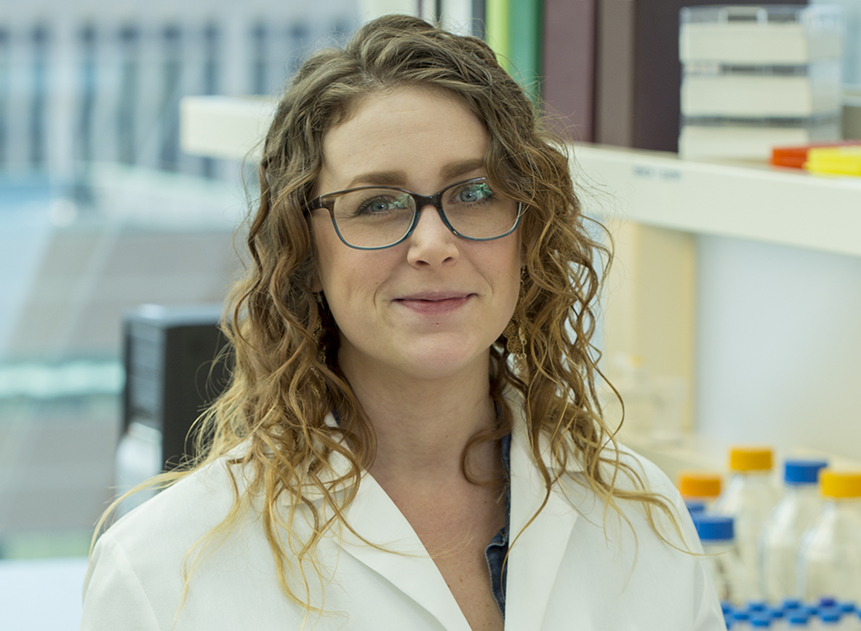Graduate student spotlight: Investigating the underpinnings of Parkinson’s
September 24, 2018

Every other month, we highlight one of Van Andel Institute Graduate School’s doctoral students. This month features Leslie Wyman, a student in the laboratory of Dr. Darren Moore. Leslie studies Parkinson’s disease, a disorder that slowly robs people of their ability to move and that is marked by a host of non-motor symptoms such as depression, cognitive decline and gastrointestinal issues. Between seven and 10 million people worldwide have Parkinson’s.

How would you describe your area of study to your grandmother?
Parkinson’s disease (PD) is a common movement disorder characterized by the loss of cells in a specific region of the brain. I study a protein that is present in the brain called LRRK2, and I am looking for ways to fix dysfunctional LRRK2 in order to try to help brain cells become healthier and live longer.
What is your primary motivation for persevering through graduate school?
The frontier of human health and disease is an exciting place to work, which is really all the motivation that I need! I love my project and it feels good to know that my work will have a positive impact on others in the future. It also helps that I work with some truly amazing people, and I have an incredible network of support within the Graduate School and at home.
What do you want to do with your degree?
I would like to continue working in the laboratory because I enjoy putting ideas into action. Long-term, however, I see myself in a leadership role because inspiring individuals and teams to work hard and achieve goals is one of my greatest strengths.
Did you take time off before starting your Ph.D. degree or come directly from an undergraduate or master’s degree program?
I did not take time off before starting my Ph.D., but I did take time off after high school to backpack Europe before beginning my undergraduate degree. The experience was one that I will never forget!
How has your previous coursework contributed to your breadth of knowledge?
After completing my undergraduate courses, I thought I knew everything but, once I started my Ph.D., I realized how little I really knew. Although my previous coursework laid a solid foundation of knowledge in molecular biology, this program has taught me that I do not need traditional classes to learn a tough subject — all l really need is the internet and lots of coffee.
Do you think there is any value in social networking with other graduate students in non-related fields?
Networking with people in any field is important. You never know who you are going to meet or what you might learn!
How do you think earning an advanced degree will change your role in society?
I have had a couple of really great women scientists as mentors throughout my academic career and I would love to use my degree to pass those experiences on to the next generation.
Did your past experiences in life or education help prepare you for graduate school or did you have to develop different strategies to succeed?
Early on in graduate school, I discovered that the “work-life balance” is really a myth. The key to my success is rooted in my ability to be adaptable and flexible at work and at home, while also remembering to not take myself too seriously.
What is your favorite stress-reduction technique?
I recently discovered that cooking is a great stress-reduction technique. I also relax during the summers while boating on Lake Michigan with my family and our two dogs.
What accomplishment (academic or other) are you most proud of?
I am most proud of how much I have grown from a student to young professional in the past few years. As a first-generation college student, it honestly just feels great to have gotten this far.
Has your perception of this Ph.D. program changed since you began the program?
Yes. This program is more supportive than I would have ever imagined. The faculty and staff sincerely want to see all their students succeed.
If you were asked to put something in a time capsule for each year you have been in the program and this capsule would not be opened for 25 years, what would you contribute?
2015: A confocal image of a neuron. I will never forget the first time I saw a neuron in a dish.
2016: My stress relief squishy collection that I acquired from my first neuroscience meeting (Society for Neuroscience).
2017: A group picture of my lab. They are practically family to me now and I would not be where I am without them.
If you had not been admitted to graduate school, what do you think you would be doing right now?
I would be an entrepreneur. I have always wanted to open my own business and I actually still hope to make that dream a reality in the future.
